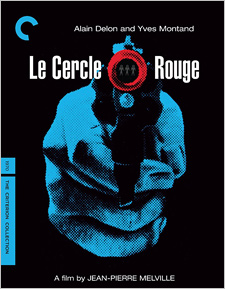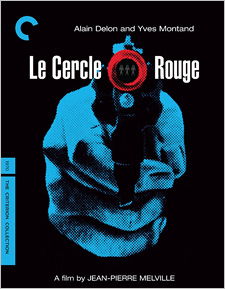Le cercle rouge (4K UHD Review)

Director
Jean-Pierre MelvilleRelease Date(s)
1970 (March 15, 2022)Studio(s)
Rialto Pictures/StudioCanal (The Criterion Collection – Spine #218)- Film/Program Grade: A
- Video Grade: A-
- Audio Grade: A
- Extras Grade: B
Review
[Editor’s Note: The film and most of the supplement review portion of Le Cercle Rouge was originally written by Barrie Maxwell for the 2011 Blu-ray release. The rest, including the video and audio review portion, is by Tim Salmons.]
French director Jean-Pierre Melville had wanted to do a heist film for some 20 years before he finally achieved his desire with 1970’s Le cercle rouge. It was a desire preceded by his viewing and admiring John Huston’s The Asphalt Jungle and one fed by an opportunity to film Rififi that in the end didn’t materialize when the task went to Jules Dassin. Melville had established his impressive film credentials concerning the criminal genre with Bob le flambeur (1956), Le doulos (1962), and Le samourai (1967) before undertaking Le cercle rouge, a film that he conceived and wrote himself.
Like Rififi, it contains a wonderfully executed and extended heist sequence in which the robbers carry out their plans with a quiet and practiced clinical exactitude. After the successful exercise (which involves the lifting of a fortune in jewelry from a location in Place Vendome in Paris), things almost inevitably begin to unravel with an almost equal precision brought to bear by the authorities. Playing the robbers is an impressive cast composed of Alain Delon as a smooth criminal just released from prison; Gian Maria Volonte, as an escaped prisoner with a ruthless streak; and Yves Montand as an ex-cop and sharpshooter trying to escape his alcoholic demons. Andre Bourvil (often simply billed as Bourvil) is the cop seeking to capture them – efficient though not above using questionable methods. There’s a degree of fate involved in how these four individuals come together, hence the title Le cercle rouge which relates to an Eastern saying that people meant to meet will do so “in the red circle” no matter what road they take in getting there. At 2 hours and 20 minutes, the film is a long one, but it never feels like it, so engaging are the narrative and the performances of all the principals.
Le cercle rouge was shot by cinematographer Henri Decaë on 35mm film (Eastman 100T 5254) using Konvas cameras and spherical lenses, finished photochemically, and presented in the aspect ratio of 1.85:1. The Criterion Collection brings the film to Ultra HD for the first time in the US with a 2022 4K restoration of the original camera negative and interpositive by StudioCanal (using a 35mm positive print as a color reference), which has been graded for High Dynamic Range in HDR10 and Dolby Vision, and presented on a triple-layered BD-100 disc.
StudioCanal released their 4K UHD presentation of Le cercle rouge two years prior with some controversy in regards to the film’s color temperatures. Criterion utilizes that same master, but has encoded it at a much more even-keeled bitrate that primarily sits between 70 and 80Mbps. StudioCanal’s UHD was also a dual-layered BD-66 disc, giving Criterion the clear edge in terms of maximum disc space to work with. Grain is fairly tight, but appears to have had a mild filter applied to smooth it out a tiny bit. In motion, most people won’t notice or care, though it does make the picture appear slightly darker than the StudioCanal release, but not by much.
In regards to the color palette, it’s an overall warmer experience, whereas previous Blu-ray releases opted for more overt blue tones. The debate rages on as to the accuracy of StudioCanal’s and Criterion’s Blu-ray and UHD releases over the years with no definitive answers. What it comes down to in the end is preference, and to my eyes, the previous Criterion Blu-ray was far too blue, to the point where it altered flesh tones and white levels significantly. That’s not the case with this new restoration, which is a much more natural palette leaning on yellow slightly, but with warmer colors and flesh tones. The HDR grades, especially the Dolby Vision, further aid in this regard. Blacks are deeper and contrast is more ideal, and the overall appearance is clean, stable, and mostly organic outside of the minor filtering I mentioned earlier. There may or may not be a 100% accurate representation of the film in existence on home video, but for me, the boost in detail and the warmer palette is much more pleasing aesthetically. Because the film isn’t overly colorful, it still retains a bit of a coldness in its look, regardless of how much blue has or hasn’t been pumped into it. As with all complicated presentations such as this, your own mileage may vary, though I suspect most will be happy with the results.
Audio is included as a single French mono LPCM with optional subtitles in English SDH. It’s a very well-balanced and clean track, with ample support for dialogue and music. It’s actually a bit more dynamic than I was expecting, which comes down to the quality of the mix itself, which is excellent. There are also no instances of hiss, dropouts, crackle, or other flaws. It’s very satisfying.
The Criterion Collection’s 2-Disc 4K Ultra HD release of Le cercle rouge sits in a clear Amaray case alongside a Blu-ray containing a 1080p version of the same restoration, along with an insert that features Criterion’s traditional artwork for the film by the Art Chantry Design Co., which hasn’t changed since their original 2003 DVD release. Also included is a 32-page insert booklet containing cast and crew information, the essay Great Blasphemies by Michael Sragow, the excerpt Melvile on Le cercle rouge, the interview Music for Melville: Composer Eric Demarsan by Stéphan Lerouge, the essays What Is the Red Circle? by Chris Fujiwara and Honor, Loyalty, and Friendship by John Woo, restoration information, special thanks, acknowledgments, and production credits. The following extras are included on the Blu-ray only:
- Archival Footage:
- Cinéastes des notre temps (SD – 27:20)
- Pour le cinéma (SD – 5:26)
- Midi Magazine (SD – 4:44)
- Vingt-quatre heures sur la deux (SD – 3:51)
- Morceaux de bravoure (SD – 9:55)
- Bernard Stora (SD – 30:14)
- Rui Nogueira (SD – 26:14)
- Trailer (SD – 1:54)
The supplement package is highlighted by three half-hour items—an episode of the French TV series Cinéastes des notre temps that focuses on Jean-Pierre Melville; an archival interview with assistant director Bernard Stora from 2003; and an interview with Rui Nogueira, author of Melville on Melville, also from 2003. Four other brief featurettes involve cast and crew (including Melville and Alain Delon) discussing the film, as well as the original theatrical trailer.
Oddly, the 2003 Rialto Pictures re-release trailer from Criterion’s previous Blu-ray release is missing in action here. Not included from the 2020 4K Ultra HD Vintage World Cinema release by StudioCanal is Jérôme Wybon’s documentary about Melville, The Perfect Circle; a 2004 introduction by film scholar Ginette Vincendeau; the 2008 documentary Sous le nom de Melville aka Code Name: Melville by Olivier Bohler; and a 2003 interview with author and screenwriter José Giovanni. Also not carried over from the long out-of-print Region 2 DVD by the British Film Institute is an audio commentary with Ginette Vincendeau and a brief biography featurette on Jean-Pierre Melville.
The late Barrie Maxwell was obviously very fond of Le cercle rouge, and I must concur. It’s Jean-Pierre Melville firing on all creative cylinders, and it’s also possibly one of his more accessible films overall. Criterion’s 4K UHD treatment will certainly not please everybody, but in light of Melville rising from the grave and actually approving a 4K master of the film personally, I guess we’ll have to make do with this one, which I’m very happy with. For that and the excellent extras and overall package, it comes highly recommended.
- Barrie Maxwell and Tim Salmons
(You can follow Tim on social media at these links: Twitter, Facebook, BlueSky, and Letterboxd. And be sure to subscribe to his YouTube channel here.)

